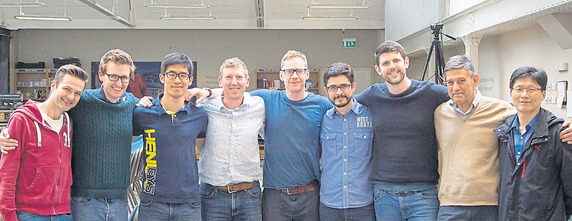SECOND CRACK AT LONDON
The Antioch Plan is recruiting again.
The Co-Mission

The selection process for the second cohort of pioneering church planters has already begun.
The Antioch Plan is the ambitious church planting initiative launched by Co-Mission in 2014 (see en May 2014). Fourteen church planters were recruited and deployed across London in a diversity of plants; some trying to reach ethnic groups (e.g. Bangladeshis or Koreans), some into resource deprived areas (e.g. Vauxhall or Becontree), some in the heart of the city (e.g. the Globe on the South Bank or London Underground Church in Covent Garden) and then others in the suburbs (e.g. Kew or Fulwell).
Like the Titanic
Richard Coekin (the Director of Co-Mission) often compares the situation here in the capital to that of the Titanic. He observes that one reason more weren’t saved from that disaster is because there were too few boats and too few of them were used for the poorer passengers. He reckons that it’s the same in London. And so Antioch is about trying to launch more gospel churches to save people from the disaster that awaits them. And God has honoured that.
From the outset it was decided that to become full members of Co-Mission, the Antioch plants needed to grow to fulfil three requirements. First,they have to have credible plural male leadership. Secondly, they have to have sustainable financial plans. And finally,the plants need to demonstrate viable gospel growth patterns.
How have they faired?
The progress of the initial 14 plants is a mixed picture. Two have regrettably closed; absorbed back into the existing ministries that launched them. But one of those is poised to plant again in a different location. Rather more encouragingly, two have been formally accepted into Co-Mission membership as fully fledged churches. Another two are close to fulfilling that hope and will be adopted in the next year. The rest need more time, but are heading in the right direction.
Of the plants, only one is part of the Church of England (St Michael’s Fulwell). This was launched with the full support of the previous Bishop of Kensington, Paul Williams and the Diocese of London.
Others are run by Free Church and Church of England trained ministers who are now looking to Co-Mission and the FIEC for support in their gospel ministries. Of the two church plants already accepted for FIEC membership one is Streatham Central Church (SCC) pastored by Alex Lyell. SCC was planted from Christ Church Balham, which although an Anglican Church, was enthusiastic about establishing an independent church to reach a neighbouring suburb. The Globe Church on the South Bank of the Thames represents a deliberately close partnership between Co-Mission and the FIEC. The lead pastor, Jonty Allcock, is now a member of the Co-Mission senior staff and was joined by Mike Sohn, an ex-Co-Mission ministry trainee and Antioch planter.
Working in partnership
These kind of intentional partnerships have been a real blessing to all involved. Richard Perkins, the Director of Antioch said: ‘It’s pretty much gone as we would have expected with the high risk but potentially high reward strategy that we employed. Some plants have flown. Others have struggled. Most are heading in the right direction. But every single one of the planters has given it a go. None of them wanted to die wondering. There are lots of great churches in London. But there aren’t enough to go round. We’re making an attempt to address that situation.’
Second cohort
However, having reflected on the progress of the initial plants, the second cohort will be launched and supported a little differently. First, the launch of the plants will be staggered over a three year period. Instead of launching a dozen plants simultaneously, four plants will be launched each year over a period of three years. This will give the Co-Mission churches greater opportunity to cooperate together and, where possible, to recruit and provide larger launch teams.
Secondly, whilst wishing to retain the priority to plant into economically under-resourced and ethnically diverse areas, they need to factor in the typical slower rate of growth in such areas for attaining financial sustainability. The second cohort needs gospel patrons who will provide generous financial support for these plants. Thirdly, greater attention will be given to developing a growing network of church-planting coaches equipped to help the individual church planters in the loneliness of leading small church plants.
September 2017
And so the Antioch Plan is once again attempting to recruit, select and deploy a new cohort of church planters to begin in September 2017.
In discussing these exciting plans Richard Perkins said: ‘It would be great if people could pray for the success of the Antioch plants. But also promote what we’re doing. We’re desperate to see more churches planted to reach the millions of unbelievers in London with the glorious gospel of our Lord Jesus Christ. If you know people who’d be keen to plant churches in London and who’d like to do it in partnership with Co-Mission, then encourage them to get in touch with us.’
To find out more visit www.theantiochplan.org.uk.


